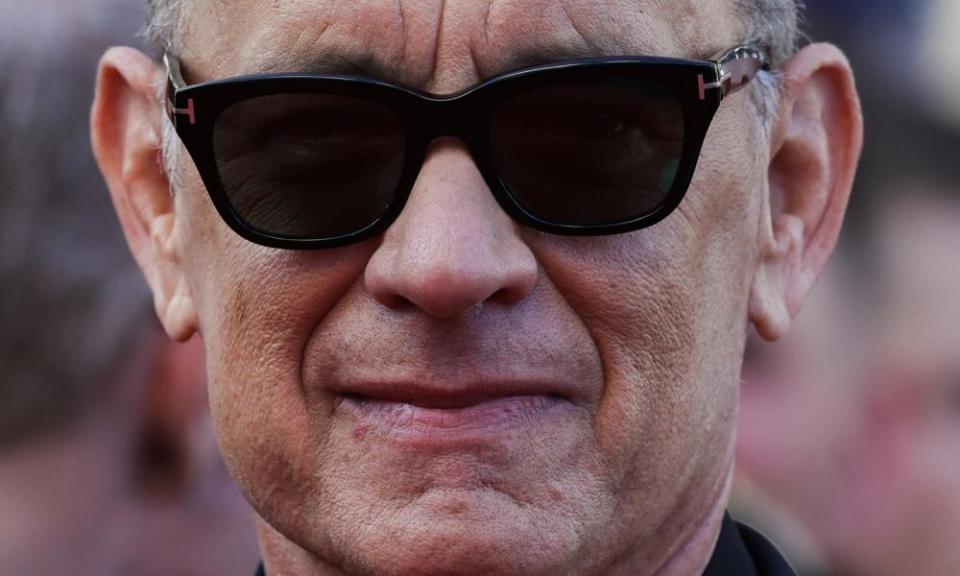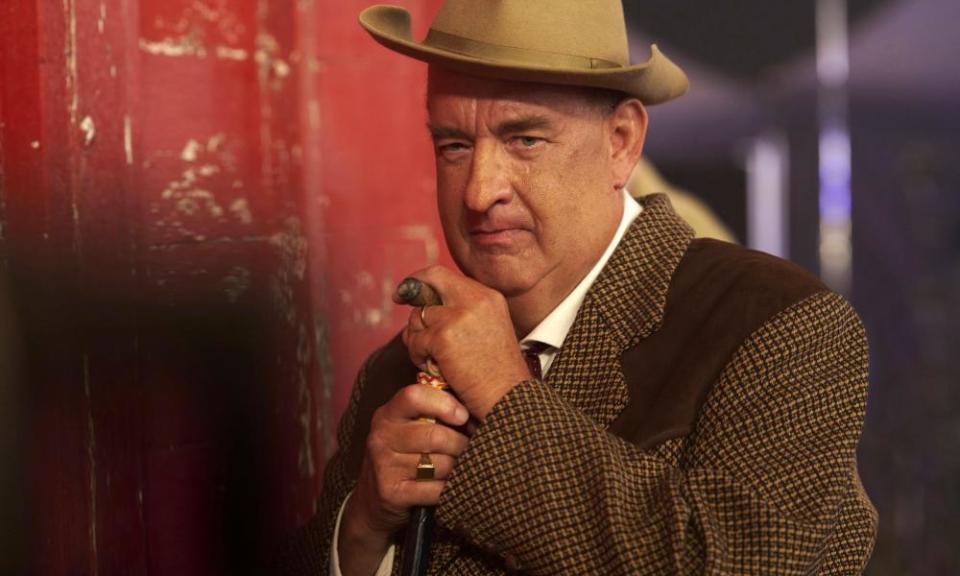Tom Hanks: the all-American good guy who stopped playing it safe

In performing arts schools and training programs, instructors often say that acting is about making big, decisive choices and committing to them totally. This seems like the best way to make sense of Tom Hanks’ outsized supporting turn in the new biopic Elvis as “Colonel” Tom Parker, Elvis Aaron Presley’s Dutch-born manager and parasitic, gambling-addicted svengali. Among the more puzzling choices made by Hanks: speaking in a vinegary twang that’s sometimes regionally indistinct, sometimes a legible fusion of deep south drawl and lyrical Euro-lilt; donning a prosthetic neck that makes him look like he’s liable to yell at Elvis to “get in my belly”; assuming a lumbering physicality that only grows more pronounced as Colonel Tom prepares to shuffle off his mortal coil in a (probably) metaphorical casino of fate. Having mastered the craft and won all the accolades, he now appears to be motivated primarily by his own amusement, like a video gamer who’s beaten the final boss and moved on to exploring the farthest limits of the virtual world in search of glitches.
Related: Elvis review – Baz Luhrmann’s squeaky-clean King is shaking no one up
As inexplicable as his Colonel Tom may be on a minute-by-minute basis, as a whole, the wild-eyed performance fits squarely within the context of Hanks’s career in its semi-experimental, drastically inconsistent late phase. The last decade has seen one of the planet’s biggest movie stars punctuating stretches of typecast roles with strange and often misbegotten forays into less-familiar territory, to varying degrees of success. He could be getting bored and looking for a novel test of skill, or as an uncharacteristically gruff recent encounter with mobbing fans suggests, he could be developing an edge as he advances through his 60s. Whatever the case, an image forms of a restless ageing expert, torn between excelling in what he’s good at and challenging himself no matter how sparse his success. For someone who’s more than earned the complacency of middle age, his continued unpredictability makes for a cockeyed act of generosity.

Up to this point, Hanks’s screen persona has been easy enough to isolate and define, his filmography well-stocked with various types of decent fellas. His splashy TV arrival in Bosom Buddies, the man-boy blockbusters like Splash and The Money Pit (then made literal by Big), the pivot to Oscar-festooned middlebrow prestige, the romcom era – they’re all united by a foundation of goodness, a red-meat morality that made Hanks impossible to hate even when playing emissary to a faceless corporation bent on flushing out Mom and Pop. With time, he’d graduate from America’s best pal, always ready with a cold beer and pick-me-up speech, to America’s dad, Atticus Finch with comedic timing. In a 2011 cameo as himself on 30 Rock, he’s seen spending his nights singing to himself and knitting in front of a television set to a low, gentle volume.
But his path hooked away from a future of porridge and prune juice in the 2010s, and split into an intriguing network of forks. He hasn’t parted ways with the Hanks we’ve come to cherish, though recent invocations of his good-guy typecasting have taken on fresh inflections. The one-time savior of Private Ryan spent much of the decade upholding the American way of life, whether by brokering peace (as in Bridge of Spies, Captain Phillips and News of the World, the latter taking him to a coarser register), defending the truth (as in The Post), and fighting for individual freedoms against the evils of big government oversight (as in Sully, though he’s more subordinate to director Clint Eastwood’s ideology). The squeaky-cleanest entries come close to parody of this tendency, though such physical embodiments of childhood purity as Walt Disney and Fred Rogers would be ultimately played straight by their attendant scripts.
If Hanks has a one-for-them, one-for-me policy, it’s in terms of mass appeal rather than personal relevance; for each crowd-pleaser that puts him back in his wheelhouse, he’s taken a gig farther off the beaten path that allows him to try out some things he hasn’t done before. As with so many men approaching his autumn years, he’s dabbled in existentialism, from the crisis-driven soul-searching of A Hologram for the King to the funereal legacy-building of Finch (in which his post-apocalyptic survivor must teach a robot to care for the world he won’t inhabit much longer). He went full-on villainous for The Circle, in which he played a big tech creep bent on full transparency through the digital surveillance state, which would’ve been his oeuvre’s most shocking departure if not for Cloud Atlas. Hanks’s noodling-around phase begins here, his six-character tour de force through the time-hopping anthological structure affording him the chance to branch out in a half-dozen different directions at once.
Whether Hanks was effective as a mutton-chopped limey gangster in Cloud Atlas can be argued ad infinitum, though that’s neither here nor there. For a few glittering moments, we can see that the most likable man in show business isn’t all that concerned with being liked, guided by a more flighty, intimate muse than he’s answered before. In the coming months, he’ll star in an American remake of the Swedish comedy A Man Called Ove (if anything like the original, an opportunity to him to don some more heavy-duty facial prosthetics) and link up with Wes Anderson for the first time on the Spain-set Asteroid City. In a career now rolling through its fifth decade, he’s still finding new firsts, easing his chief virtue of charm and ceding its space to curiosity for its own sake. Say what you will about Hanks’s showing in Elvis as Mephistopheles doused in sausage gravy: it’s proof that there’s nothing he won’t, or can’t, do.

 Yahoo Movies
Yahoo Movies 